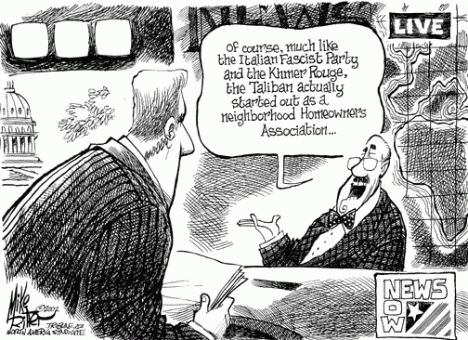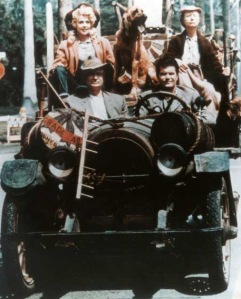A clash between a military family and a homeowners association (HOA) has made me realize that we need to include HOAs in our local government chapter.
The family fell $977.55 behind on their dues to the Heritage Lakes Homeowners’ Association in Frisco, Texas. The HOA sent multiple letters to the home. Captain Michael Clauer was deployed in Iraq and his wife was depressed over her husband’s deployment and didn’t open the mail. The HOA initiated foreclosure proceedings and the family’s $300,000 home was sold at auction for $3,201 and then re-sold for $135,000. By the time he returned from deployment, Clauer and his family were facing eviction. Fortunately, Captain Clauer was protected by the Servicemembers Civil Relief Act that protects members of the US military who are fighting for their country. Unfortunately, the law had been ignored in this case and it took months to resolve the problem and return the home to Clauer. A gag order requires that neither side talk about the final agreement. Members of the Texas Legislature filed bills to remedy the problem. Not much happened. That’s another story.
Homeowners associations are authorized by state laws in a fashion similar to local governments and function like local governments in that they create rules for citizens. HOAs are voluntary in the sense that you sign an agreement when you purchase a home located in the HOA’s jurisdiction and you have the choice of purchasing a house somewhere else. Of course, that could be said about buying a home in any city or state.
Like other governments, HOAs are organizations designed to facilitate the cooperation of citizens. Texas has many specialized governments including municipal utility districts and mosquito control districts that help Texans do together some things they can not do individually. For example, mosquito control districts are valuable in that one property owner spraying for mosquitos on their property doesn’t do much to stop those pests. As it turns, out mosquitos don’t mind flying across property lines to bite you. So, we create a mechanism for collection action that sprays area wide.
HOAs serve a variety of citizen needs. Some use the dues collected to provide parks, pools, golf courses, and other facilities that are beyond the means of most individual homeowners. Many create design or other standards that help homeowners protect their property values by making sure that everyone does their part to make sure that the neighborhood stay nice and attractive. Of course, deciding what makes a neighborhood attractive or desirable creates disagreements and sometimes these rules get pretty specific. Some HOAs have standards that require homeowners select their exterior paint colors from a limited palette of three or four colors. Some tell you what your mailbox must look like.
One property my wife and I looked at (briefly) came with over 10 pages of rules. I read as far as the rule prohibiting owning a ferret. My concerns went beyond my right to bear ferrets. I have never owned a ferret and probably never will. I realized that anyone setting up a neighborhood willing to worry about my ownership of small mammals would likely have rules that would prove to be of greater consequence.
An example of an HOA rule with a greater consequence (for some Texans) relates to the kind of vehicles you can park in front of your house in the Stonebriar neighborhood in (again) Frisco, Texas. (I love the Frisco Roughriders, but I’m starting to have real doubts about Frisco in general.) As the Dallas Morning News reported, Stonebriar HOA’s rules place strict limits on what kind of vehicles you can park in your driveway. You can not park boats, trailers, golf carts or RVs in driveways. You can park nice cars and luxury trucks, including the Cadillac Escalade, Chevy Avalanche, Honda Ridgeline and Lincoln Mark LT, in your driveway.
 However, you can not park most Ford, Dodge or Chevy pickups. Those have to be hidden away in the garage lest your neighbors or visitors be traumatized by seeing them. So, when Jim Greenwood was surprised when he was told that his Ford F-150 pickup needed to be put out-of-sight and not left in the drive. He thought he had a sufficiently nice truck. Not so, said the HOA. But, he claimed, his Ford F-150 was similar to the Lincoln Mark LT. The HOA believed that “Lincoln markets to a different class of people.” Insulting a Texan’s pickup is almost as bad as making fun of his wife or dog. A flurry of news stories followed and many Texans were left to ponder their relationship with their HOA.
However, you can not park most Ford, Dodge or Chevy pickups. Those have to be hidden away in the garage lest your neighbors or visitors be traumatized by seeing them. So, when Jim Greenwood was surprised when he was told that his Ford F-150 pickup needed to be put out-of-sight and not left in the drive. He thought he had a sufficiently nice truck. Not so, said the HOA. But, he claimed, his Ford F-150 was similar to the Lincoln Mark LT. The HOA believed that “Lincoln markets to a different class of people.” Insulting a Texan’s pickup is almost as bad as making fun of his wife or dog. A flurry of news stories followed and many Texans were left to ponder their relationship with their HOA.
The case of the F-150 and Stonebriar’s HOA illustrate a couple of good points.
1) HOAs go to great lengths to create rules that police the community in order to protect property values and we often sacrifice a little of our freedom (or a lot of our little freedoms) for such protections.
 (2) Sometimes when you move to the right neighborhood to have the right kind of neighbors you learn you’re not exactly the right kind of person. That’s the paradox of seeking to be exclusive. As Groucho Marx said, “I don’t care to belong to a club that accepts people like me as members.” Exclusive rules have to keep somebody out. It could be you. You may feel confident based on the truck commercials you see during the Cowboys game that your F-150 will be the envy of all who behold it, but some neighbors may see you as the Beverly Hillbillies rolling into the neighborhood.
(2) Sometimes when you move to the right neighborhood to have the right kind of neighbors you learn you’re not exactly the right kind of person. That’s the paradox of seeking to be exclusive. As Groucho Marx said, “I don’t care to belong to a club that accepts people like me as members.” Exclusive rules have to keep somebody out. It could be you. You may feel confident based on the truck commercials you see during the Cowboys game that your F-150 will be the envy of all who behold it, but some neighbors may see you as the Beverly Hillbillies rolling into the neighborhood.
Texans, like everyone else, struggle to strike a balance between enjoying their freedom and protecting themselves. One person I knew told me about how he wanted to live outside city limits so that he could do whatever he wanted with his property. Like many Texans, he relished the freedom that the open spaces of Texas promised. Ironically, he spent a lot of time complaining about his neighbor’s property. They were enjoying their freedom in a messier way than he cared for. He wanted them to have to clean up junk on their property–especially as he prepared to sell his own.
And, do not take “property values” to mean that this is simply a matter of cosmetics and/or status. A home is usually the biggest investment a family makes. If the behavior of neighbors drops your property values by 25% you are facing a substantial loss (about $35,000 on the typical Texas home).
 Of course, I feel sympathy for Jim Greenwood, ferret owners, and everyone else who suddenly find themselves on the wrong side of the new Texas caste system. Still, there are lessons in modesty that such cases bring out. To quote Pogo, “We have met the enemy and he is us.”
Of course, I feel sympathy for Jim Greenwood, ferret owners, and everyone else who suddenly find themselves on the wrong side of the new Texas caste system. Still, there are lessons in modesty that such cases bring out. To quote Pogo, “We have met the enemy and he is us.”
One of the lessons we tried to highlight in Lone Star Politics is that the idea of private property is something of a legend. If you live within the city limits the use of your property is subject to rules established by city ordinances in general as well as zoning regulations that tell you whether your property can be put to residential, commercial or industrial use. For example, you can not open a business in the middle of a residential area. Cities also have distinction within these broad zoning categories relating to the type of residences (single or multi-family), level of industry (light or heavy), and manner of commercial use. Additionally, a variety of easements allow phone, electric, cable, or other companies to come onto your property and dig holes, trim trees, and do whatever else it takes to access their wires.
So, your home may be your castle. How you use it is often in the hands of others.

Filed under: Local Government | Tagged: homeowners associations, property rights | Leave a comment »








